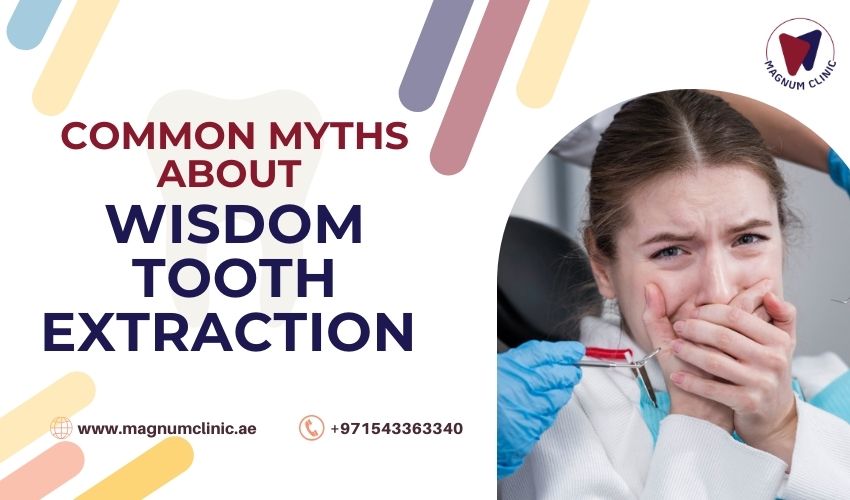7 Common Myths About Wisdom Tooth Extraction Debunked

Wisdom tooth extraction is a common dental procedure that many individuals face at some point in their lives. However, various myths and misconceptions surround this process, leading to unnecessary anxiety and fear. In this article, we aim to debunk seven common myths about
wisdom tooth extraction and provide a clearer understanding of the procedure. It will help individuals, especially patients with dental issues, make informed decisions about their oral health.
Facts And Myths About Wisdom Tooth Extraction
Here, we are debunking the top 7 myths about Tooth Extraction and sharing the true facts about them. Take a look!
Myth 1: Only Problematic Wisdom Teeth Need Extraction
One prevalent misconception is that only problematic or painful wisdom teeth require extraction. In reality, even seemingly healthy wisdom teeth can lead to issues over time. These third molars, located at the back of the mouth, often lack sufficient space to emerge properly. As a result, they can become impacted, causing pain, swelling, and damage to adjacent teeth. Regular dental check-ups and X-rays can help identify potential issues early on, allowing for proactive management.
Myth 2: Wisdom Tooth Extraction Is Always Painful
Another common myth is that wisdom tooth extraction is an extremely painful procedure. While it's natural to feel some discomfort, advancements in dental anaesthesia and pain management techniques have significantly minimised the pain associated with this surgery. Dentists typically administer local anaesthesia to numb the area, and in some cases, patients may receive sedation to ensure a more relaxed experience during the procedure.
Myth 3: Everyone Needs Their Wisdom Teeth Removed
Contrary to popular belief, not everyone needs their wisdom teeth removed. The decision to extract wisdom teeth depends on various factors, including the size of the jaw, the alignment of the teeth, and the presence of symptoms such as pain or swelling. Some individuals may have sufficient space in their jaw for the wisdom teeth to erupt properly without causing issues. Regular dental check-ups and consultations with a dentist or oral surgeon can help determine the best course of action for each individual.
Myth 4: Recovery Is Long and Difficult
Some people fear a lengthy and challenging recovery period after wisdom tooth extraction. In reality, the recovery time varies from person to person, and advancements in surgical techniques have made the process more efficient. While some discomfort and swelling are common in the days following the procedure, most individuals can resume their normal activities within a few days. Following post-operative care instructions, including proper oral hygiene and avoiding certain foods, can significantly aid in a smoother recovery.
Myth 5: Wisdom Tooth Extraction Causes Facial Deformities
There is a misconception that extracting wisdom teeth can lead to facial deformities or a changed appearance. This myth likely stems from the fear that removing molars may impact the structure of the jawbone. However, when performed by a skilled and experienced oral surgeon, wisdom tooth extraction should not result in any significant alteration to facial aesthetics. In fact, addressing impacted or misaligned wisdom teeth can prevent potential complications and preserve the overall health of the oral cavity.
Myth 6: Wisdom Tooth Extraction Is Only for Young Adults
While it's true that wisdom teeth typically emerge during the late teens or early twenties, adults of all ages may require extraction. Whether due to late eruption, impaction, or other dental issues, wisdom tooth extraction is a viable option for individuals beyond their twenties. Dentists assess each case individually, considering factors such as oral health, symptoms, and the potential for future complications.
Myth 7: Wisdom Tooth Extraction Leads to Speech Problems
Some individuals fear that removing wisdom teeth may negatively impact speech patterns or cause difficulty in pronouncing certain words. However, when performed by a qualified oral surgeon, the extraction of wisdom teeth is unlikely to result in speech problems. The human body adapts remarkably well to changes, and any temporary alterations in speech patterns are usually minimal and short-lived.
Major Key-Takeaways
Dispelling common myths about wisdom tooth extraction is essential for promoting informed decision-making and reducing unnecessary anxiety surrounding the procedure. Hopefully, this article has cleared your doubts and made you wiser about the tooth extraction process.
After all, by understanding the realities of a common dental surgery, individuals can approach wisdom tooth extraction or any other dental procedure with greater confidence and understanding. So, in case you are still having any doubts or want to get facts about any myths, consult dental experts near you now!
Remember regular dental check-ups, open communication with oral health professionals, and a proactive approach to oral care can help you maintain optimal dental health for a long time.
Frequently Asked Questions (FAQs)
What are the alternatives to tooth extraction?
In some cases, alternatives like root canal therapy or dental crowns may be considered to save a damaged or decayed tooth. However, the decision depends on the specific condition of the tooth and the overall oral health of the individual.
What is the recovery time after a tooth extraction?
Recovery time varies, but most people can resume their normal activities within a day or two. Following post-operative care instructions, such as avoiding certain foods and maintaining proper oral hygiene, is crucial for a smooth recovery.
Does tooth extraction hurt?
Dentists use local anaesthesia during tooth extraction to numb the area, ensuring patients feel little to no pain during the procedure. In some cases, sedation may be used to help patients relax.
